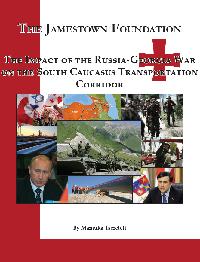The Impact of the Russia-Georgia War on the South Caucasus Transportation Corridor
By:

*Click here to view the full PDF of this report
Executive Summary
The August 2008 war in the Caucasus revealed the new strategic realities that have emerged in the Black Sea / Caspian Region in recent years. These realities have been driven by overly ambitious Russian policies and have weakened Western strategic interests in the region. The conditions created immediately after the war appeared more favorable to Russia and less favorable to other nations in the region, most notably Armenia, Azerbaijan, Turkey, and Ukraine.
But the world economic crisis and its impact on Russia, as well as the Russia-Ukraine gas dispute in January 2009, have diminished Russia’s gains and further damaged Russia’s reputation as a reliable energy supplier to Europe. In the long run, Russia may face very serious problems of separatism on its own territory due to Russia’s recognition of the breakaway provinces of Georgia. Given these uncertainties, it may be natural to expect that there will be stronger drive to get away from: 1) dependency on Russian energy in Europe; and 2) dependency on Russian transit infrastructure in Caspian /Central Asia region. In the long run, that may be reflected by Russia’s weakened strategic position in Europe and Central Asia.
The August war in Georgia demonstrated some risks associated with the functioning of the transit energy corridor in the southern Caucasus. It also demonstrated the need for broader security guarantees for a region that is vital to European and global energy security. The most important finding of the paper is that while the corridor has a tremendous potential to augment its transit capabilities with new pipelines, railroads, marine and air ports, the security of the South Caucasus transportation corridor cannot be taken for granted. Moreover, Western countries will need to ensure stability and security in the region in order for the corridor to meet its full potential.
The Russian invasion of Georgia established new strategic realities in Eastern Europe and Central Eurasia. It was the culmination of Russia’s impressive comeback in Eastern-European and Central-Eurasian affairs that has occurred in response to high energy prices, a weak US strategic position, European division and uncertainty in Turkey’s strategies. The war made clear that Russia is willing to use force to deepen and promote its interests, while western powers are not. This fact was predictable, but not certain to some. The war in Georgia helped firmly establish this reality and may also indicate that even NATO members may not be fully protected by their commitment to that organization. As the Russia-Georgia conflict demonstrates, military force has once again become a major factor in Russian foreign policy. Nevertheless, economic provisions and energy incentives are still the primary tools employed by Russia to further its foreign policy interests abroad.
At the same time, the weak Western response to Russia actions may send the wrong signal to the Russian leadership about the level of freedom it has to use force in what Russia considers its sphere of influence. Furthermore, the weak economy and the declining popularity of Russian leaders may create internal instability within Russia and tempt Russian leaders to once again utilize force to further their objectives. Europe and the United States need to carefully consider their policy response to such scenarios.
Another major finding of this paper is that energy is an important factor in the stability of any country and, in Georgia’s case, domestic energy security is also the foundation for stability of transit, and development of the entire regional infrastructure. The physical damage to the infrastructure and the environment in Georgia as a result of the war was tangible but not large. The damage to Georgia’s transportation system is repairable in a relatively short period of time. The pipelines are gradually approaching pre-conflict volumes of the oil and natural gas shipments although the shipments via railway, ports, and air have all shown signs of decline. Instead, the key problem emerged with the malfunctioning of the largest energy facility in the country – the Enguri hydro power plant.
The reservoir for the power plant is located on Georgian-controlled territory while the actual electricity production plant is located on Abkhaz/Russian controlled territory. The Georgian leadership had to make a very difficult political decision in accepting the offer of the Russian company Inter RAO (the subsidiary of the giant Russian state-owned energy monopoly Inter RAO United Energy Systems (UES)) on joint operation of the power plant. While there is a positive history of activities of the Inter RAO UES in Georgia, the Russian state-owned company’s control of a key electricity supplier for the entire country is not the best political and economic security outcome for Georgia.
Lastly, the paper argues that the initial damage that the war inflicted upon the political reliability of the transit corridor is gradually diminishing and that new opportunities are emerging. The complete reversal of this damage can be possible but will depend on U.S. and EU policy, the role of Turkey, internal stability in the Caucasus region, and Russian policy in Central Asia and the Caucasus. It is important to remember that when the initial decision to revitalize the energy corridor through Georgia and Azerbaijan was made in the mid 1990s, the security environment was extremely difficult and there was no infrastructure to support shipment of oil through the corridor, yet leadership of the United States and Turkey supported that decision and helped to implement it. Today’s environment is much more favorable considering the functioning infrastructure and greater demand for Caspian energy.
New natural gas discoveries in Turkmenistan and the next stage in oil and gas developments in Kazakhstan and Azerbaijan will require additional export capacity and a tough battle is ahead between the different export options, each supported by state sponsors with competing interests. It is significant in this context that Kazakhstan and Azerbaijan signed an agreement on November 14, 2008, to develop a Trans-Caspian oil transportation that will include onshore oil pipeline in Kazakhstan and a tanker fleet in the Caspian Sea to ship Kazakh oil to the Baku-Tbilisi-Ceyhan (BTC) pipeline and on to the world markets. As it was indicated at the Budapest summit devoted to the Nabucco pipeline project on January 27, significant progress has been made on the development of a natural gas link between the Caspian and Europe, and Georgia has an important role to play.
These developments indicate that the energy producing countries of the region are determined to seek the diversification of export options, but they need to be supported by the United States, and in particular European, NATO, or Turkish security guarantees. After all, Western Europe and Turkey are the major consumers and beneficiaries of Caspian energy resources.





